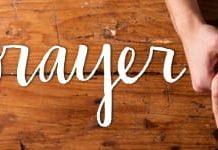A federal court ruled Wednesday that government meetings may begin with a moment of prayer, overturning a previous court ruling that such religious display was unconstitutional.
In a full review by the 6th Circuit Court of Appeals, they overturned their own ruling – which consisted of only three of the justices – against the Jackson County, Michigan, Board of Commissioners.
The three-court ruling stated that invocations – or a prater – before the meetings violated the Constitution’s Establishment Clause.
First Liberty, a conservative legal organization, praised the ruling.
“We applaud the 6th Circuit for its decision today. The court faithfully followed controlling Supreme Court precedent, and it’s a big win for religious liberty consistent with the Constitution,” Ken Klukowski, Senior Counsel at First Liberty, told The Daily Caller News Foundation.
First Liberty defended Jackson County, citing several Supreme Court decisions that held that prayer before a public meeting doesn’t violate the Constitution’s “separation of church and state” clause.
The court’s decision will likely mean a review of a previous decision by a different court. Back in July, the Fourth Court of Appeals ruled that prayer before public meetings in North Carolina – during the Rowan County Commission – violated the Establishment Clause.
First Liberty – which defended that case as well – is likely to now appeal the decision. Klukowski said that the 6th Circuit’s decision had “tremendous” bearing on the future outcome of the Rowan County case.
“The 6th Circuit, correctly in our view, reached exactly the opposite conclusion, saying that the fact that the person offering prayers happens to hold public office – that in and of itself doesn’t coerce anyone,” he said.
“So long as the government does not take an official action against you to retaliate for the fact that you don’t like their religious activity — or is somehow taking official action to denigrate you, to go after you — so long as that’s not happening, the Establishment Clause permits various practices that all sorts of us on an individual level might not personally agree with,” he said.
It all comes down to coercion. The 6th Circuit Court and the Supreme Court decisions decided that just because someone is offended by a prayer or invocation doesn’t mean they are being coerced into participating.
“Now, one thing that was specifically focused on in Town of Greece that’s relevant here is that the court acknowledged that people may be offended by prayers. But in our form of democratic society, we all see and hear things every day that offend us. Just because it offends us does not make it unconstitutional. As the court explicitly said ‘offense does not equate to coercion,’” Klukowski told TheDCNF.
The recent decision shows a turn back to the original intent of the Establishment Clause – first interpreted in 1791. In 2014, in the Town of Greece v. Galloway, the Supreme Court ruled that local governments’ use of prayer before meetings does not constitute coercion or “Endorsement” as they define it.
“So long as something was historically accepted, and no one is being coerced by the government, the Establishment Clause is satisfied, and its just left to politics and the democratic process in terms of what’s going to be allowed and what’s not,” Klukowski told TheDCNF.
Facebook has greatly reduced the distribution of our stories in our readers’ newsfeeds and is instead promoting mainstream media sources. When you share to your friends, however, you greatly help distribute our content. Please take a moment and consider sharing this article with your friends and family. Thank you.
thefederalistpapers.org
In a surprising turn of events, a split Supreme Court ruled 5-4 Monday that it is legal for legislative bodies to begin meetings with prayer.
Town of Greece v. Galloway , a case centered on the legality of regularly holding prayer before town meetings, divided the Justices and resulted in the High Court’s overturning a previous lower court ruling that found the town council in violation of the Constitution. In their dissent the court’s liberals, including Justices Ruth Bader Ginsberg and Sonia Sotomayor, argued “When citizens of this country approach their government….they should not confront government-sponsored worship that divides them along religious lines.” University of Virginia Professor of Law Douglas Laycock, in representing the complaining residents, concurred and argued further that the town’s practice forced citizens who might not agree with the prayer to either participate against their will or irritate council members from whom they hoped to receive favorable action. The decision was met with immediate criticism and incited a larger debate questioning whether it is possible for a government to accommodate the nation’s religious traditions without endorsing beliefs not shared by all. Read more
here
.
froebegroup.com











